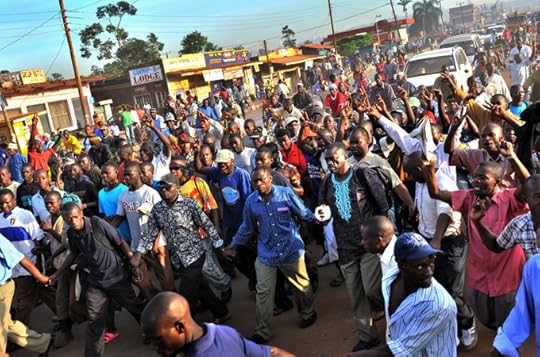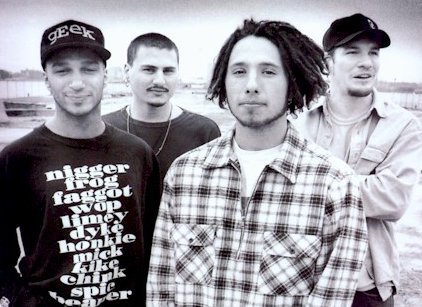Sean Jacobs's Blog, page 653
April 29, 2011
Tough Bond
Although the effect of blending the music by Shabazz Palaces and the images of documentary-in-the-making Tough Bond escapes me, for now, I am looking forward to seeing the end results (both of the documentary and the Shabazz Palaces first full album Black Up). Shabazz Palaces sure know how to pick their directors. Remember the video for their 'Belhaven Meridian' by Kahlil Joseph:
http://www.youtube.com/watch?v=VMZKPa...
Kahlil Joseph, who in his turn also shot a magnetic short film for Brazilian musician and actor Seu Jorge (featuring a cover of Roy Ayers's 'Everybody Loves the Sunshine' and Kraftwerk's 'The Model'):
– Tom Devriendt








April 28, 2011
Music Break
Apparently Akala is "second generation black Caribbean and half white Scottish." He also has some things to say on a different kind of stage.
H/T: Mikko Kapanen








Mamdani on Uganda
The Ugandan intellectual Mahmood Mamdani is back in Uganda–since last year he's been heading up the Makerere (University) Institute of Social Research (MISR) in the capital Kampala–where he has already pronounced on the "consultancy culture" in Ugandan (and continental) universities. Mamdani, once close to Uganda's Life President Yoweri Museveni (in power since 1986) has also just published an opinion essay on the stand-off between the Ugandan government and the "Walk to Work" protests by opposition forces:
In Uganda today, prevailing governance seeks to divide the population by politicising ethnicity. The motto is: one tribe, one district. Inside the district, an administrative tribalism divides the bafuruki from those designated as indigenous to the district. As a mode of governance, tribalism institutionalises offical discrimination against some citizens and in favour of others.
New ideas nurture new practices. Given time, even the most revolutionary idea can turn into a routine divorced of meaning. Think of how we have managed to reduce the practice of democracy to routine rituals.
The remarkable thing about the events we know as 'Walk to Work' is that they have followed on the heels of a national election whose results were anything if not decisive. Whatever its outcome, 'Walk to work' must make us rethink the practice of democracy in Uganda.
For a start, one is struck by the spread of cynicism among both rulers and ruled. More and more in the population thinks of elections not as the time to make meaningful choices but as a time to extract dues from politicians who are unlikely to be sighted until the next election season!
Similarly, more and more in the political class are coming to think of elections as a managed exercise where the outcome is decided not by who votes but by who oversees the counting of votes. What does it say about contemporary democracy that even an election where those in power can win support of a vast majority of people, over 90% in Egypt and over two-thirds in Uganda, does not give you any idea of the level of dissatisfaction among the electorate?
Consider one remarkable fact. In spite of the growth of universities and think tanks worldwide, researchers and consultants have been unable to forecast most major event in contemporary history.
Why? This was true of [the] Soweto 1976 [uprising in South Africa], it was true of the fall of the Soviet Union and it was true of the Egyptian revolution [earlier this year]. What does it say about the state of our knowledge that we can foretell a natural catastrophe – an earthquake, even a tsunami – but not a political shift? The rule seems to be: the bigger the shift, the less likely is the chance of it being foretold.
I think this is so for one reason. Big shifts in social and political life require an act of the imagination. They require a break from routine, a departure from convention. That is why social science, which is focused on the study of routine, of institutional and repetitive behaviour, is unable to forecast big events.
Herein lies the challenge for Uganda's political class.
No matter how small the numbers involved in the developments we know as 'Walk to Work', there is no denying its sheer intellectual brilliance. That brilliance lies in its simplicity, in its ability to confer on the simplest of human activities, walking, a major political significance: the capacity to say no.
The irony is that many in the opposition, and perhaps just as many in government, seem to think of 'Walk to Work' as a shortcut to power, which it is unlikely to be. The real significance of 'Walk to Work' is that it has broken the hold of routine. In doing so, it presents us with a challenge. That challenge is to come up with a new language of politics, a new mode of organization, and a new mode of governance.
From this vantage point, I would like to offer a few reflections by way of conclusion.
We should resist the temptation to think of Tahrir Square – as Soweto before it – as a road map. Rather, let us think of Egypt as a vision, a democratic vision, as both event and process. Remember that it took nearly two decades for the Soweto Uprising to deliver a democratic fruit in South Africa. When it comes to Egypt, the democratic revolution has just begun. None knows how long it will take to institutionalise its fruit.
Today, we need to acknowledge that Tahrir Square has not led to a revolution, but to a reform. And that is not a bad thing. The lesson of Egypt – unlike that of Libya next door – is the moral force of non-violence. Unlike violence, non-violence does not just resist and exclude; it also embraces and includes, thereby opening up new possibilities of reform, possibilities that seemed unimaginable only yesterday.
The challenge before the Ugandan political class today is not to close ranks for a final struggle, as it is habitually prone to doing. The real challenge is to forge possibilities for a new politics, on the basis of new associations and new imaginations. The real challenge is not revolution but reform. The verdict is still out whether it is government or opposition that will take the lead and provide the initiative.
Full article here.








Jamming for Sanitation
By Indira Govender*
The Social Justice Coalition's Freedom Day toilet queue was quite an achievement, considering that the last time such a large crowd of Capetonians took to the streets in protest was against the US invasion of Iraq.
Freedom Day 2011 was different. Roughly 1000 people congregated in and around St George's Cathedral at noon, to express their frustration at the lack of basic services in the townships of Cape Town. Key speakers Archbishop Thabo Makgoba, Vuyiseka Dubula and Zackie Achmat warmed everyone up by reminding us why we were there: to show solidarity for our brothers and sisters who survive each day without access to clean water, decent toilets or security and to remember those, like Andries Tatane, who lost their lives taking on this post-apartheid struggle. The gathering doubled as more people poured into the venue and then we walked, 2000 strong followed closely by armed police, to the Cape Town Civic Centre. There we stood in a queue, symbolic of the queues that residents of Site B (Khayelitsha), Gugulethu, Nyanga and other deprived areas in the mother city have to stand in if they want to use one of the portable chemical toilets on offer in their neighbourhood.
While we queued, members of the SJC read the petition that over 10,000 people had signed, before a representative of the mayor made his way down the steps of the Civic Centre through a barricade of police to receive it. It was a peaceful demonstration, people stood together, some sang, others danced, thank God no one got shot, but we made our point.
*Indira is a Cape Town resident working in public health.








Media Criticism
April 27, 2011
This is Freedom
In Helen Zille's Western Cape, MTV is currently filming, "Clifton Shores," a reality TV series about a group of mostly white, young people (four Americans and three South Africans "who serve as their guides to life in a new country") predictably working for an events company and "having fun" in Clifton, a wealthy district of Cape Town on the other side of Table Mountain. The producers promise that Cape Town, "… a new and exotic location for US audiences," has "European style and African spirit in equal abundance," and that the show "… will showcase the glamorous lifestyle of Cape Town's rich and fabulous."
More information here and here. If you can bear it, you can watch the trailer here .
H/T: Stephen Sparks








Music and Politics
If you have nothing to do tonight and are in New York City, head down to The New School tonight where Boima and I are hosting musicians Brian Jackson and Masauko Chipembere and writers Carolina Gonzalez, Eddie Stats Houston and Wills Glasspiegel for "A Conversation on Music and Politics."
And this panel comes with an after party. Starting at 10pm Eddie Stats and Boima will be DJing at Cayenne Lounge on West Houston. The party also doubles as a kind of unofficial Sierra Leone 50th Independence party.
Here are the details.








Native Son
Youtube is streaming all of the 44-odd minutes of Blitz the Ambassador's second studio album, "Native Sun."
The album will be released May 3rd in North America, and May 6th Worldwide.
I have already pre-ordered my copy.








Sierra Leone 50 Years

Today, April 27, marks Sierra Leone's 50th independence anniversary. The participants of We Own TV are getting in on the celebratory action by making short videos on various topics related to the idea of 50 years independence.
For the above video they teamed up with the Sierra Leone Refugee All Stars to see what people on the streets of Freetown have to say about independence. Check the We Own TV kickstarter campaign for more information and a sneak peak on what looks like will be a very interesting set of videos.–Boima Tucker.








April 26, 2011
Music Break
Beautiful video for the single "You will never know" by the young, French-Comoran singer, Imany. The video was directed by Andrew Dosunmu.
H/T: Tony Karon.








Sean Jacobs's Blog
- Sean Jacobs's profile
- 4 followers















